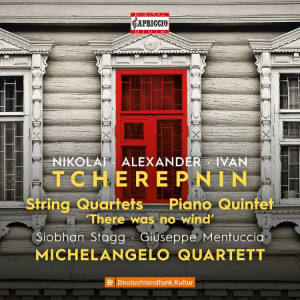
Nikolai Tcherepnin (1873-1945)
String Quartet in A Minor Op. 11 (1902)
Alexander Tcherepnin (1899-1977)
String Quartet No. 1 Op. 36 (1922)
String Quartet No. 2 Op. 40 (1926)
Piano Quintet in G major Op. 44 (1927)
Ivan Tcherepnin (1943-1998)
There was no wind for soprano and string quartet (1996)
Siobhan Stagg (soprano), Giuseppe Mentuccia (piano), Michelangelo Quartet
rec. 2021, Boulez Saal, Berlin, Germany
English text and German translation included
Capriccio C5503 [2 CDs: 91]
The Tcherepnins were a Russian musical dynasty of three generations who, among them, covered the most tumultuous years of the twentieth century. Nikolai had a thriving career in pre-Revolutionary Russia, where he composed and conducted, including being Diaghilev’s house composer before being supplanted by Stravinsky. After the Revolution he lived in Georgia for a time but eventually emigrated to Paris. His son Alexander was a prominent neo-classical composer, part of group which included Honegger and Martinů, travelled widely and in his later years settled in the U.S.A.. His son Ivan studied with Boulez and Stockhausen and was closely associated with the European avant-garde, though he later moved to more traditional forms. Alexander has been the most recorded, but a wide variety of music by all three is available.
Here we have chamber works, all featuring the Michelangelo Quartet. We begin with the only string quartet of Nikolai. This is an early work, written while he was still working in the Russian romantic tradition before it became touched by impressionism. This is a four movement work, with a very substantial scherzo, full of good tunes, easy to follow and very attractive. Think of the quartets of Borodin; it is almost as good and well worth hearing.
We then have Alexander’s two quartets. The sleevenote explains that that he had been working to simplify his idiom, with the first quartet marking the end point of this process. He then moved in the opposite direction with more complex forms. However, to me they sound quite similar, in an idiom which moves from Romanticism towards Expressionism without quite getting there: think of the Bartók of his early works, notably his first quartet. Alexander’s first quartet is a terse single movement while the second is in three short movements. These are good works but not outstanding.
Ivan’s ‘There was no wind’ is a contribution to the small but interesting genre of string qurtets with an added voice part. This was begun by Schoenberg and other examples come from Respighi, Schoeck and Samuel Barber. Ivan wrote this towards the end of his life, when he returned from experimental to more traditional forms. It sets a poem whose provenance is not given, in which guests arrive at a hall but it is destroyed and the speaker offers to make new ones. The poem is quite long and the setting is illustrative rather than developing a consistent musical argument. It is quite attractive but not particularly memorable.
The final work is quite another matter. Alexander’s piano quintet is in three movements and I was wholly gripped by it. Although it comes only a year after the second of his quartets, his idionm has now settled down and is very close to Martinů, with the same driving rhythms melodic invention and slight tone of melancholy. In fact Martinů wrote two piano quintets himself, but they are both later than this work and may have been influenced by it. The first movement is much the longest, at just over ten minutes and develops its ideas in detail. The second is a squib and the finale a little more ighthearted than the first movement. Along with Nikolai’s quartet, it is the best music here.
The Michelangelo Quartet go for all these works with vigour and there is also some really lovely playing. Siobhan Stagg sings well in ‘There was no wind’ and Giuseppe Mentuccia is a fine partner in Alexander’s piano quintet. The recording, made in cooperation with Deutschlandfunk Kultur, is good. The sleeve notes are a bit skimpy about the works, and say not one word about Nikolai’s quartet, but they do contain biographies. If you are interested in the byways of Russian music you will like this.
Stephen Barber
Help us financially by purchasing from




















